The 7 Best GitLab Certifications and How to Decide
GitLab produces numerous training courses for its community of developers. But for this article, we are more interested in GitLab’s certifications. This level of training is more advanced and intensive, making the certification valuable in the job market. We’ll take a look at some of GitLab’s best certifications.
GitLab Certified Associate
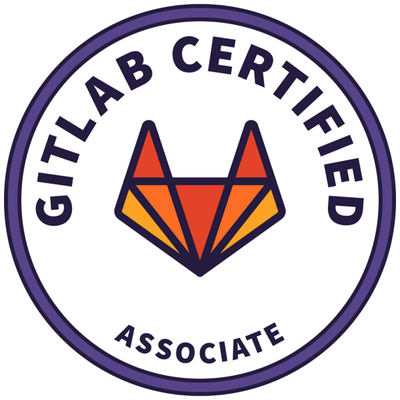
The GitLab Certified Associate course is an excellent entry-level course for people who aren’t familiar with git. Specifically, the course covers GitLab fundamentals. You’ll learn how to perform basic git commands and use GitLab for the entire DevOps lifecycle.
Some of the practical actions you’ll learn to perform:
- How to create an issue
- How to branch and merge locally and remotely
- How to create a merge request
- How to make a commit
- How to create a project
The course is available for anyone who wants to take it. There are no perquisites like previous instructor-led GitLab training. You also don’t need to take the course before enrolling for the final exam. Still, it’s an excellent course for beginners who expect to adopt GitLab in their daily work.
The GitLab Certified Associate is delivered in two ways. First, there’s an instructor-led option for teams of up to 12 members. There’s also a self-service option where you can complete the certification at your own pace.
You’ll receive your own demo working environment. This is where you’ll do your exercises. A GitLab instructor validates the exercises.
You’ll also need to pass a one-hour written exam and a two-hour practical lab assessment to earn your certification. The written exam has multiple choices. It’s designed to assess your knowledge of git and GitLab fundamentals.
You’ll need to answer all the questions correctly on the written exam before taking the lab assessment exam. You can also take the written exam as many times as you need to score 100%.
Lastly, the two-hour lab assessment exam takes place in your demo environment. Here, you’ll need to perform tasks such as merging branches and creating issues correctly to pass the exam.
The only downside of this course is the cost. You’ll need to pay $650 to enroll in the class and take the exam. It’s a steep price considering it’s an introductory course for learning the fundamentals of GitLab. However, it will fast-track your proficiency in Git compared to on-the-job learning.
GitLab Certified InnerSourcing Specialist
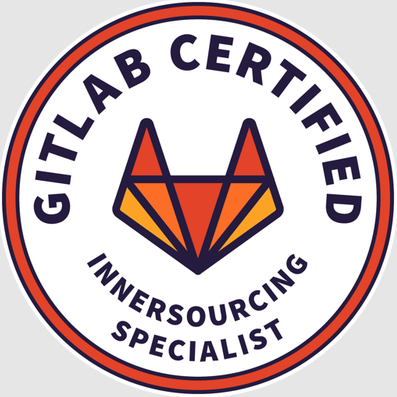
GitLab Certified Innersourcing Specialist is another beginner-level course offered by GitLab. Again, you don’t need to take the course before taking the final exam. But it certainly helps to prepare adequately for the best chance of success.
The course teaches InnerSourcing in-depth, including its key components, best practices, and how to use InnerSourcing functions in GitLab. It is perfect for cross-functional development team members who want to adopt open-source best practices to proprietary code.
GitLab’s technical trainers deliver the course via live training sessions, hands-on labs, lectures with demonstrations, and slides with notes and reference links.
There are two options for taking the course. First, you can take it remotely. In this case, the training is delivered as two three-hour sessions. The two sessions take place on different days. It costs $5000 for up to 12 attendees.
Alternatively, you can take the on-site course. It’s a seven-hour session with an hour lunch break. The on-site course costs $7,000 for up to 12 attendees, plus the instructor’s travel expenses. You can add more seats at $500 per seat.
It’s helpful if you’re already familiar with agile development and source code management before taking the course. It’s an excellent program for organizations adopting InnerSource for non-open-source or proprietary software.
GitLab Certified CI/CD Specialist
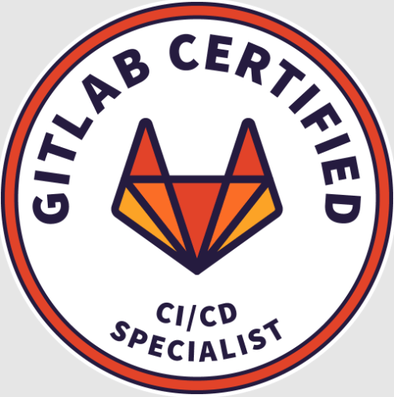
GitLab Certified CI/CD Specialist is an intermediate technical certification. The certification demonstrates your competence in GitLab’s DevOps processes and best practices. You’ll need to pass a one-hour written test and one-hour hands-on lab assessment to earn this certification.
It’s an attractive certification for many reasons. First, many organizations adopt continuous development, delivery, and integration to speed up software development and release. You’ll be able to showcase your competence in setting up, configuring, and applying GitLab’s CI/CD functions.
Furthermore, your knowledge is invaluable when working on concurrent development projects in GitLab. In-depth continuous integration, continuous development, and continuous delivery knowledge are crucial for setting up and using GitHub for these kinds of projects.
There are no perquisites for taking the course. Simply pay the registration fee, and you’re ready to access the course material and training. But, of course, you can also jump right to the exam without taking the course.
Again, the price is a little steep at $650 for the technical certification. But, the money is well spent compared to the GitLab Certified Associate certification. Demonstrating your CI/CD competence certainly helps your resume for InnerSourcing projects.
However, GitLab also offers more advanced follow-up courses worth the price. These include:
- GitLab Certified Advanced CI/CD Professional
- GitLab Advanced CI/CD Training
You’ll still need to complete the beginner’s course. However, it’s still worth taking all three courses and certifications to advance your career progression.
GitLab Certified Project Management Specialist
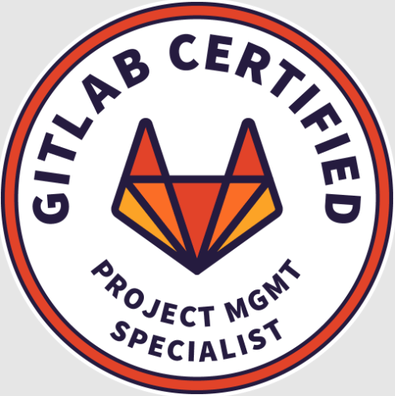
GitLab Certified Project Management Specialist is another intermediate certification for experienced and aspiring project managers. The course covers the best practices for using GitLab’s features to manage your development project. You’ll learn to use features like issues, epics, agile portfolio management tools, Kanban boards, burndown charts, and milestones.
This certification is also excellent for agile teams. Members learn Kanban-style project management and issue tracking with scrum. This unified knowledge is crucial for getting your team on the same page during every stage of the DevOps lifecycle.
You’ll need a lab assessment and a written test to earn your certification. The final exam covers:
- Setting up projects using issues, milestones, labels, and groups
- Managing projects using GitLab roadmaps, epics, and boards
- Developing portfolio plans using GitLab
It’s a worthwhile course for project managers or people transitioning into project management. This is especially true if your organization pays for training and development. Again, the course costs $650 but might be worthwhile if you plan to manage projects primarily in GitLab.
On the downside, the course may be too vendor-specific. A more general project management course may be more useful in the job market. This case is especially true for freelancers.
GitLab Certified Security Specialist
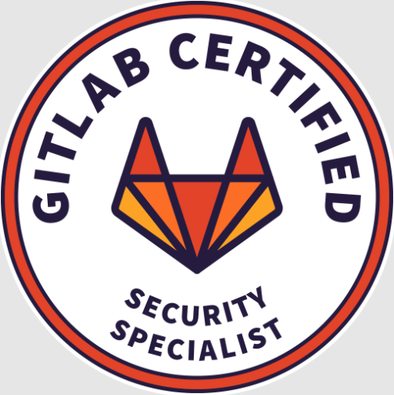
Most organizations are focused on shifting security left. This framework requires moving security early in the software development process. The GitLab Certified Security Specialist certification is specifically designed for this scenario.
The course teaches how to secure software development in GitLab. You’ll learn about the best practices, such as continuous security testing, scanning, and remediation. You’ll also learn about GitLab’s security capabilities, including policy management, license compliance, dependency and container scanning, SAST, and DAST.
You’ll need to pass a written exam and lab assessment to earn your certification. There are also no perquisites for taking the exam.
Again, the course is expensive, considering you’re learning security fundamentals in GitLab. You can learn this yourself by interacting with the tool. However, it’s a great option if your company pays for it.
Otherwise, self-learning is the cheaper and better option. You’ll also be able to answer interview questions from an experience perspective compared to classroom learning. You can also find a lot of the course information for free if you interact with GitLab’s community.
GitLab Certified DevOps Professional
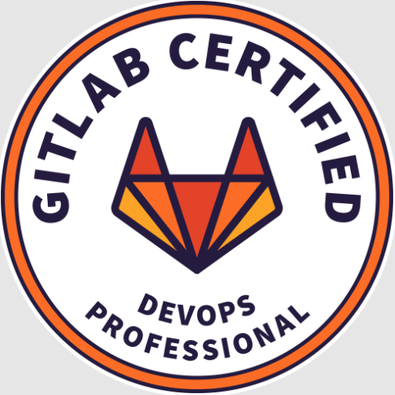
GitLab Certified DevOps Professional is an intermediate technical certification for experienced DevOps. The certification proves your competence in DevOps stages, functions, and lifecycle. You’ll need to pass four exams to earn your certificate.
This certification is perfect for job-hunting in organizations that use GitLab for their development processes. However, it’s also suitable for team leaders who want to ensure their team members are competent in using GitLab. Such teams naturally benefit from less complexity, more automation, and better collaboration.
The final exams cover a broad range of DevOps objectives, from performing basic git commands to testing performance and inspecting logs. It’s an excellent course for an in-depth understanding of GitLab’s CI/CD, project management, and security capabilities.
Again, there’s the option of an instructor-led training or self-service portal.
On the downside, there are perquisites for earning this certification. You’ll need the following GitLab certifications to be eligible to take the exam:
- GitLab Certified Associate
- GitLab CI/CD Specialist
- GitLab Project Management Specialist
- GitLab Security Specialist
Remember, you’re paying at least $650 for each of these certifications. Plus, it’s time-consuming if you only want the DevOps certification. So instead, you can get a cheaper course that won’t make you jump through hoops to earn your certificate.
GitLab Certified Systems Admin Professional
GitLab Certified Systems Admin Professional is more targeted than the courses we’ve mentioned. It has a particular audience. Namely, the GitLab system owner and administrator.
Additionally, this certification only applies to self-managed instances. Still, it’s worth exploring for the person responsible for setting up and updating GitLab’s self-managed instance.
The course delivery options include on-site and remote. The on-site course is a single session lasting nine hours. There is a one-hour lunch break. The remote course is delivered in two sessions lasting four hours each. These sessions happen on separate days.
Some of the specifics the course teaches include:
- Installing GitLab
- Configuring settings
- Adding and removing users
- Managing user access
- Performing backups restores, and upgrades
The course price varies depending on the customized topics you choose. However, it’s a worthwhile investment for a system administrator for self-managed GitLab. It can help reduce rollout and performance headaches.
Any company considering self-hosted GitLab should consider paying for this certification for its systems admins. It’s also a valuable certification for systems admins working primarily with GitLab.
GitLab also offers GitLab System Admin Specialist certification. It’s more advanced and may be worth considering after you’ve earned your professional designation. But, again, it may help fast-track your career and is especially worth it if your employer pays for it.
How to Pick Your GitLab Course
Picking a GitLab course shouldn’t be difficult. There are only a handful of things to consider before making your decision.
Step 1 – Decide What You Want to Specialize In
The first step is to consider the area you want to specialize in. GitLab only offers limited public certifications. The available certificates are limited to:
- CI/CD
- Project management
- DevOps
- Innersourcing
- Security
- System admin
It is worth noting that GitLab’s certification is vendor-specific. It doesn’t necessarily carry over to other platforms like GitHub. This isn’t a problem if your organization primarily uses GitLab.
However, you may need a vendor-neutral certification if you’re on the job market and want to boost your resume. Of course, you can always enroll for GitLab certification when you need it.
Step 2 – Assess Your Proficiency
GitLab classifies its certifications as Beginner, Intermediate, or Advanced. The best course depends on where you are in your career. So pay attention to the certification level before signing up.
For example, the GitLab Certified Associate course is perfect for someone who’s never set eyes on a GitLab portal or isn’t familiar with git. However, it’s too basic for someone who uses GitLab daily. It would be a waste of money in this case.
Similarly, the GitLab Certified CI/CD Specialist may be too basic if you are already familiar with the fundamentals of GitLab’s pipelines and functionality. You may want to consider more advanced courses, such as GitLab Certified Advanced CI/CD Professional.
You may be less discerning if your organization pays for continuous education. In this case, you can take as many certifications as you think will be helpful for your career. It will undoubtedly help improve your job-related skills and knowledge.
Step 3 – Choose Your Certification
Generally, GitLab doesn’t require you to take a course before sitting for the certification exam. However, consider the cost of these certifications. In addition, you’d want to be ready for the final exam and ace it on the first try.
There are exceptions. For example, advanced GitLab certifications require you first take the beginners course. On the other hand, you’ll likely ace the test if you have solid GitLab experience under your belt.
Again, consider speaking to your employer about paying for the certification. These courses make the most sense if you aren’t paying out of pocket. Still, some of the advanced GitLab certifications may be valuable enough for freelancers to justify the cost.

